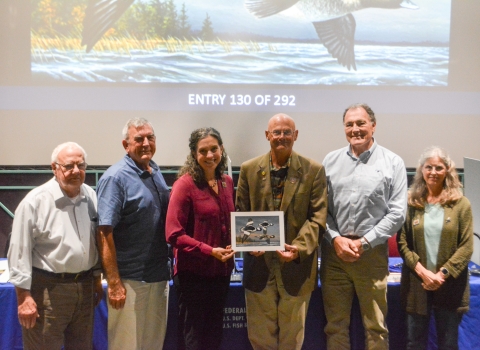Press Release
Birds play a significant ecological, economic and cultural role in our Lives.
The U.S. Fish and Wildlife Service is partnering through its Wildlife Without Borders program with fifteen countries in South and Southeast Asia and the Near East to conserve tigers, elephants, rhinos, orangutans, gibbons, marine turtles, amphibians and other endangered animals. Service funding of $4.6 million in 2011 has leveraged $6.1 million in matching funds for these conservation projects.
“Wildlife populations in South and Southeast Asia and the Near East are suffering from habitat destruction, poaching and conflict between wildlife and people. This area – habitat for the 40 surviving Javan rhinos and critical populations of tigers and orangutans – is crucial to the success of our conservation efforts,” said Teiko Saito, Assistant Director for International Affairs.
Fifty-three Service grantees are working throughout South and Southeast Asia and the Near East including Indonesia, India, Cambodia, Thailand, Vietnam, Malaysia, and Sri Lanka.
Funding for wildlife conservation projects through Wildlife Without Borders – Species, Regional, Global – a $15.5 million suite of grants across the globe. For more information on the U.S. Fish and Wildlife Service’s Wildlife Without Borders program, including detailed summaries of 2011 grant projects from South and Southeast Asia, the Near East and other regions, visit www.fws.gov/international.
Follow Wildlife Without Borders on Twitter @USFWSInternatl and on Facebook, USFWS_InternationalAffairs.
“Wildlife populations in South and Southeast Asia and the Near East are suffering from habitat destruction, poaching and conflict between wildlife and people. This area – habitat for the 40 surviving Javan rhinos and critical populations of tigers and orangutans – is crucial to the success of our conservation efforts,” said Teiko Saito, Assistant Director for International Affairs.
Fifty-three Service grantees are working throughout South and Southeast Asia and the Near East including Indonesia, India, Cambodia, Thailand, Vietnam, Malaysia, and Sri Lanka.
- In Cambodia, the Wildlife Alliance is expanding its successful Kouprey Express environmental education project, emphasizing elephant conservation to disadvantaged students in protected areas around the Cardamom Mountains.
- In Thailand, the World Wildlife Fund is conducting outreach and improving sanctuary management for a globally significant population of pileated gibbons.
- In Indonesia, the State University of Papua is engaging local communities in a recovery program for the largest remaining Western Pacific leatherback sea turtle nesting population.
- In Malaysia, the Wildlife Conservation Society is improving law enforcement efforts for tigers in the Endau-Rompin landscape to protect habitat corridors.
Funding for wildlife conservation projects through Wildlife Without Borders – Species, Regional, Global – a $15.5 million suite of grants across the globe. For more information on the U.S. Fish and Wildlife Service’s Wildlife Without Borders program, including detailed summaries of 2011 grant projects from South and Southeast Asia, the Near East and other regions, visit www.fws.gov/international.
Follow Wildlife Without Borders on Twitter @USFWSInternatl and on Facebook, USFWS_InternationalAffairs.


